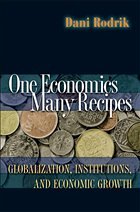In One Economics, Many Recipes , leading economist Dani Rodrik argues that neither globalizers nor antiglobalizers have got it right. While economic globalization can be a boon for countries that are trying to dig out of poverty, success usually requires following policies that are tailored to local economic and political realities rather than obeying the dictates of the international globalization establishment. A definitive statement of Rodrik's original and influential perspective on economic growth and globalization, One Economics, Many Recipes shows how successful countries craft their own unique strategies--and what other countries can learn from them.
To most proglobalizers, globalization is a source of economic salvation for developing nations, and to fully benefit from it nations must follow a universal set of rules designed by organizations such as the World Bank, the International Monetary Fund, and the World Trade Organization and enforced by international investors and capital markets. But to most antiglobalizers, such global rules spell nothing but trouble, and the more poor nations shield themselves from them, the better off they are. Rodrik rejects the simplifications of both sides, showing that poor countries get rich not by copying what Washington technocrats preach or what others have done, but by overcoming their own highly specific constraints. And, far from conflicting with economic science, this is exactly what good economics teaches.
Review:
"Although there are many articles and books on economic growth, this book is different because it proposes a new perspective that is likely to have a significant influence on academic economists as well as policymakers around the world. Dani Rodrik's new approach respects the fundamental economic principle of the market, but it also allows individual countries to formulate their own growth strategies based on their own local conditions."--Yingyi Qian, University of California, Berkeley
"In this important book, we have an author (Dani Rodrik) whose views are eminently worth hearing and a subject (globalization) in constant need of hearing them. Rodrik has long been a passionate but nuanced thinker on the role of 'economic fundamentals' in shaping growth. He resolutely uses the tools and methods of economics even as he arrives at conclusions that often do not square with what orthodox economics might prescribe or want to hear."--Michael Woolcock, the World Bank
To most proglobalizers, globalization is a source of economic salvation for developing nations, and to fully benefit from it nations must follow a universal set of rules designed by organizations such as the World Bank, the International Monetary Fund, and the World Trade Organization and enforced by international investors and capital markets. But to most antiglobalizers, such global rules spell nothing but trouble, and the more poor nations shield themselves from them, the better off they are. Rodrik rejects the simplifications of both sides, showing that poor countries get rich not by copying what Washington technocrats preach or what others have done, but by overcoming their own highly specific constraints. And, far from conflicting with economic science, this is exactly what good economics teaches.
Review:
"Although there are many articles and books on economic growth, this book is different because it proposes a new perspective that is likely to have a significant influence on academic economists as well as policymakers around the world. Dani Rodrik's new approach respects the fundamental economic principle of the market, but it also allows individual countries to formulate their own growth strategies based on their own local conditions."--Yingyi Qian, University of California, Berkeley
"In this important book, we have an author (Dani Rodrik) whose views are eminently worth hearing and a subject (globalization) in constant need of hearing them. Rodrik has long been a passionate but nuanced thinker on the role of 'economic fundamentals' in shaping growth. He resolutely uses the tools and methods of economics even as he arrives at conclusions that often do not square with what orthodox economics might prescribe or want to hear."--Michael Woolcock, the World Bank
